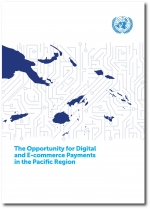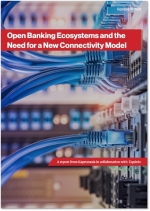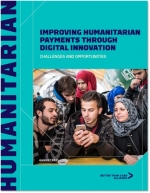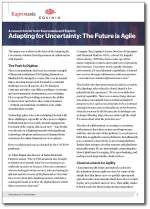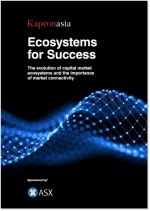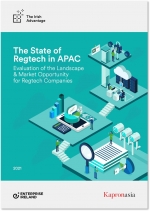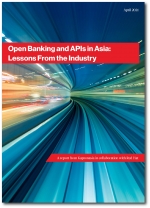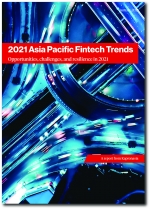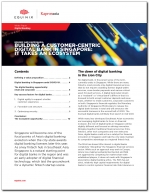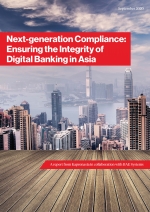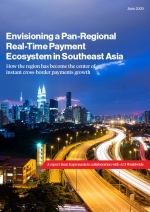Financial Industry Research Reports
The Opportunity for Digital and E-commerce Payments in the Pacific Region - a report from the UNCDF in collaboration with Kapronasia
Published: Sep 2021Pacific Island countries have an opportunity to leverage digital payment solutions to help provide equitable access to financial services and improve economic conditions.
Open Banking Ecosystems and the Need for a New Connectivity Model - a report from Kapronasia in collaboration with Equinix
Published: Sep 2021The COVID-19 pandemic will be looked back upon in years to come as a key milestone in the digital transformation of financial institutions (FIs), with open banking playing a critical role in that transformation.
Improving Humanitarian Payments Through Digital Innovation: Challenges and Opportunities - a report from the Better Than Cash Alliance, co-authored by Kapronasia
Published: Aug 2021Digital humanitarian payments have been evolving rapidly, and the COVID-19 pandemic has accelerated the acceptance of digital payments across the globe.
Adapting for Uncertainty - a research brief from Kapronasia and Equinix
Published: Jul 2021The recent pandemic has been an extreme example of financial institutions (FIs) finding themselves blindsided by disruptive events. But meeting unexpected demands is a constant across all aspects of an FI’s business. Customer priorities can also shift according to economic and environmental circumstances, necessitating FIs to respond by providing customers the ability to choose how and where they want to transact – without encountering exorbitant costs, and ensuring data security remains paramount. This paper was written on the basis of the Adapting for Uncertainty webinar from Kapronasia in collaboration with Equinix.
Ecosystems for Success - a report from Kapronasia sponsored by ASX
Published: Jul 2021The advent of electronic trading in the 1980s in the United States introduced a new era of algorithmic or high frequency trading (HFT) whereby firms tried to get their trading applications as close as possible to an exchange’s matching engine to lower latency and speed up trade execution. By the 2000s, the exchanges were moving their matching engines into colocation data centres, where they were joined by the HFTs that would find no better substitute to being colocated in the same building as the matching engine itself. Today, it is no longer all about speed, and the belief that it is only HFTs that are in exchange colos could not be further from the truth.
State of Regtech in APAC - a report from Kapronasia and Enterprise Ireland
Published: Jul 2021Asia, with its gleaming skyscrapers dotting some of the world's major financial centers and home to more than half the world's population, is at an inflection point. Facing spiralling compliance costs and a dynamic regulatory environment, financial institutions have turned to regulatory technology (regtech) to help acheive compliance while minimising risk from misconduct and regulatory investigations.
Staying Resilient - A paper from Kapronasia and SmartStream
Published: Jun 2021Automation, cloud, and artificial intelligence technologies are enabling financial institutions (FIs) to reduce overhead, touchpoint, and risk of human error around middle- and back-office operations. The use of these technologies has taken on new relevance amid the coronavirus pandemic and accompanying shift to working online as FIs needed to completely re-think how to run their businesses. Now more than ever, the financial industry must use innovative solutions to enhance operational efficiency and competitiveness, while striving to enhance service levels offered to their customers and remain compliant.
Open Banking and APIs in Asia - A paper from Kapronasia and Red Hat
Published: Apr 2021Both regulatory and competitive forces have been making Open Banking a new reality across the region. Banks are now realizing that if they want to keep their existing customers, acquire new ones, and play a greater role in their customers’ lives then they must become more customer focused, while offering a broader range of digital products and services. To do this effectively, banks will no longer be able to be vertically integrated institutions and will be required to shift to a distributed Open Banking model to collaborate with third parties. Such a model requires APIs, the digital ports that enable communication between services.
Delivering a Secure Digital Experience - A paper from Kapronasia and Jumio
Published: Mar 2021With the rise of digital banks and fintechs across the region, the race is on to acquire new customers. Customer experience built on new, innovative product offerings will become a key differentiator. On the other hand, the growing financial crime threats means that regulators will continue to tighten their AML/KYC requirements. It is imperative for financial institutions (FIs) to take into consideration the diverse operational and regulatory landscape designing their eKYC processes to offer better remote onboarding experience while ensuring AML/KYC compliance.
2021 Asia Pacific Fintech Trends
Published: Jan 20212021 marks the tenth year that Kapronasia has produced our fintech trends report. In 2011, our focus was completely on the mainland China market, but as our business expanded, today we are present in Shanghai, Singapore, Taipei, Seoul, and Tokyo and our trends report has grown to match our footprint.
2021 Asia Trends and Outlook: The Future Fight against Financial Crime - A paper from Kapronasia and NICE Actimize
Published: Jan 2021The digitization of the Asia-Pacific financial sector has accelerated amid the coronavirus pandemic as individuals and businesses move online. While this presents new opportunities, it also poses new risks as financial criminals follow the money online. With face-to-face contact reduced for safety and hygiene reasons, it is more challenging than ever for financial institutions to stay ahead of fraudsters and money launderers.
Building A Customer-centric Digital Bank in Singapore - A paper from Kapronasia and Equinix
Published: Oct 2020Singapore will become one of the focal points of Asia’s digital banking evolution when the city-state awards digital banking licenses later this year. As a key fintech hub in Southeast Asia, Singapore is a natural starting point for digital banks in the region and was an early adopter of digital financial technology, which laid the groundwork for a dynamic fintech startup scene.
Next-generation Compliance: Ensuring the Integrity of Digital Banking in Asia
Published: Sep 2020In recent years, the financial services industry has digitized rapidly, with transactions becoming speedier and more efficient. This transformation has mostly been a positive development for financial services providers and their customers. However, as the industry landscape has changed, illicit activity has moved in tandem. Put simply, just as it is much easier to complete certain legitimate financial transactions online than at the retail outlet of a bank, financial crime now happens just as quickly.
The Asia Pacific Gig Economy 2020
Published: Sep 2020The gig economy is roughly defined as a prevalence of short-term contracts or freelance work as opposed to permanent jobs. As the global economy changes, the gig economy has been growing rapidly. According to a recent Mastercard report, the digital gig-economy generated ~USD 204 billion in revenue in 2018, or, for comparison, just over half (56%) of Malaysia’s economy in 2019. The size of gig-economy transactions is projected to grow by a 17 percent compound annual growth rate with a Gross Volume of ~USD 455 billion by 2023, or just over four-fifths (86%) of Thailand’s GDP in 2019.
Envisioning a Pan-Regional Real-Time Payment Ecosystem in Southeast Asia from ACI & Kapronasia
Published: Jun 2020Asia Pacific (APAC) is the fastest-growing region in the world, but also one of the most challenging. A melange of countries with different languages, cultures, economies, and political priorities has made regional, cross-border cooperation, financial or otherwise, difficult.

